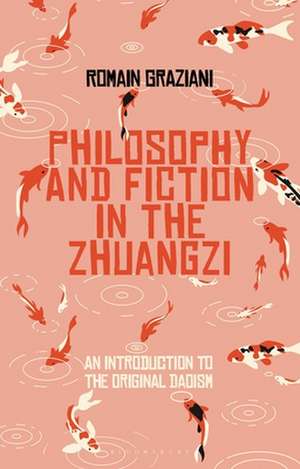Fiction and Philosophy in the Zhuangzi: An Introduction to Early Chinese Taoist Thought
Autor Romain Grazianien Limba Engleză Paperback – 23 dec 2020
| Toate formatele și edițiile | Preț | Express |
|---|---|---|
| Paperback (1) | 157.62 lei 22-36 zile | |
| Bloomsbury Publishing – 23 dec 2020 | 157.62 lei 22-36 zile | |
| Hardback (1) | 465.72 lei 43-57 zile | +81.73 lei 5-11 zile |
| Bloomsbury Publishing – 23 dec 2020 | 465.72 lei 43-57 zile | +81.73 lei 5-11 zile |
Preț: 157.62 lei
Preț vechi: 190.08 lei
-17% Nou
Puncte Express: 236
Preț estimativ în valută:
30.16€ • 31.30$ • 25.21£
30.16€ • 31.30$ • 25.21£
Carte disponibilă
Livrare economică 24 februarie-10 martie
Preluare comenzi: 021 569.72.76
Specificații
ISBN-13: 9781350124318
ISBN-10: 1350124311
Pagini: 216
Dimensiuni: 138 x 216 x 24 mm
Greutate: 0.57 kg
Editura: Bloomsbury Publishing
Colecția Bloomsbury Academic
Locul publicării:London, United Kingdom
ISBN-10: 1350124311
Pagini: 216
Dimensiuni: 138 x 216 x 24 mm
Greutate: 0.57 kg
Editura: Bloomsbury Publishing
Colecția Bloomsbury Academic
Locul publicării:London, United Kingdom
Caracteristici
Features translations of passages from the Zhuangzi alongside running commentary on the philosophy of the text that shows how it can relate to the real possibilities of life
Notă biografică
Romain Graziani is Professor in Chinese Studies at the École Normale Supérieure de Lyon, France, and Senior Reader at the University of Geneva, Switzerland.
Cuprins
ForewordIntroductionPart I: Humans Versus Animals1. Carving up a Myth in the Kitchens of Power2. Zoocide: Reflections on the Zhuangzi BestiaryPart II: Humans Versus Death3. One Monster, Two Mortals, and Myriad Metamorphoses4. Fun at the FuneralsPart III: Humans Versus Heaven5. Acesis and Ecstasy6. The Way of True MenConclusionFurther Reading and BibliographyIndex
Recenzii
The Zhuangzi is by far the most captivating, challenging and playfully profound piece of philosophical literature to have emerged from ancient China. Stringing together its stories and quirky characters with refreshingly new insight and zest, Graziani is a delightful reading companion to this fascinating text.
Graziani demonstrates through a series of close readings that the style and wit of the Zhuangzi are by no means achieved at the expense of philosophical depth- that, rather, the work's aesthetic appeal and moral seriousness are inseparable. For the first time, the work's determined rejection of almost all the schemes of value current in Warring-States China is revealed. Zhuangzi's art of dialogue, his empathy with 'unreliable' characters, his handling of the taboo topic of death, his twists and turns, are patiently and wonderfully brought out.
The Zhuangzi is one of the most imaginative and inventive works in world philosophy. Through his nuanced analyses and outstanding translations, Graziani beautifully conveys the philosophical complexity, the literary subtlety, and the marvelous wit of this extraordinary text. This is a wonderful and tremendously exciting book.
Luxuriating in the richness of the Zhuangzi's delightfully irreverent stories, Graziani resists the pressure to distill tidy philosophical lessons from them. Instead, he unleashes his own dazzling literary skill to show how the fictional dimensions of the work are not simply a side show but form the living heart of the text's philosophical vision.
Graziani demonstrates through a series of close readings that the style and wit of the Zhuangzi are by no means achieved at the expense of philosophical depth- that, rather, the work's aesthetic appeal and moral seriousness are inseparable. For the first time, the work's determined rejection of almost all the schemes of value current in Warring-States China is revealed. Zhuangzi's art of dialogue, his empathy with 'unreliable' characters, his handling of the taboo topic of death, his twists and turns, are patiently and wonderfully brought out.
The Zhuangzi is one of the most imaginative and inventive works in world philosophy. Through his nuanced analyses and outstanding translations, Graziani beautifully conveys the philosophical complexity, the literary subtlety, and the marvelous wit of this extraordinary text. This is a wonderful and tremendously exciting book.
Luxuriating in the richness of the Zhuangzi's delightfully irreverent stories, Graziani resists the pressure to distill tidy philosophical lessons from them. Instead, he unleashes his own dazzling literary skill to show how the fictional dimensions of the work are not simply a side show but form the living heart of the text's philosophical vision.
